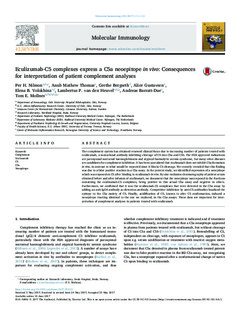Eculizumab-C5 complexes express a C5a neoepitope in vivo: Consequences for interpretation of patient complement analyses
Nilsson, Per; Thomas, Anub Mathew; Bergseth, Grete; Gustavsen, Alice; Volokhina, Elena B.; van den Heuvel, Lambertus P.; Barratt-Due, Andreas; Mollnes, Tom Eirik
Journal article, Peer reviewed
Published version
Permanent lenke
http://hdl.handle.net/11250/2482806Utgivelsesdato
2017Metadata
Vis full innførselSamlinger
Sammendrag
The complement system has obtained renewed clinical focus due to increasing number of patients treated with eculizumab, a monoclonal antibody inhibiting cleavage of C5 into C5a and C5b. The FDA approved indications are paroxysmal nocturnal haemoglobinuria and atypical haemolytic uremic syndrome, but many other diseases are candidates for complement inhibition. It has been postulated that eculizumab does not inhibit C5a formation in vivo, in contrast to what would be expected since it blocks C5 cleavage. We recently revealed that this finding was due to a false positive reaction in a C5a assay. In the present study, we identified expression of a neoepitope which was exposed on C5 after binding to eculizumab in vivo. By size exclusion chromatography of patient serum obtained before and after infusion of eculizumab, we document that the neoepitope was exposed in the fractions containing the eculizumab-C5 complexes, being positive in this actual C5a assay and negative in others. Furthermore, we confirmed that it was the eculizumab-C5 complexes that were detected in the C5a assay by adding an anti-IgG4 antibody as detection antibody. Competitive inhibition by anti-C5 antibodies localized the epitope to the C5a moiety of C5. Finally, acidification of C5, known to alter C5 conformation, induced a neoepitope reacting identical to the one we explored, in the C5a assays. These data are important for interpretation of complement analyses in patients treated with eculizumab.

